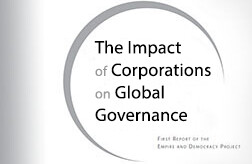Executive Summary
In "The Impact of Corporations on Global Governance," three leading corporate social responsibility (CSR) experts discuss the growing influence of corporate power on democratic governance.
Former United Nations Assistant Secretary-General John Ruggie describes "the potential role of the corporation in making the global system more effective at pursuing multilateral objectives." He tells the story of corporate social responsibility in three parts:
- the NGO-driven movement toward accountability and reporting;
- the use of social capacity-building as a means for corporations to do good while performing well; and
- the hurdles presented by growing imbalances in the systems of global rule-making.
In order to repair the failures of traditional state regulation, Ruggie believes that a new fusion of civil society actors and corporations is needed, as these two sectors already perform functions that once fell to states alone. He envisions this fusion as creating a "more inclusive [global public space] within which, and from which, other social actors can graft the pursuit of broader social agendas onto the reach of the corporate sector."
From his perspective as President of the Committee for Economic Development, an organization of business and education leaders, Charles Kolb describes the corporation as a political institution. He believes that corporate self-interest goes beyond mere profitability to having a stake in local communities and healthy labor markets. Kolb discusses how NGOs can tailor their strategies, when engaging corporations on issues of CSR, toward finding common ground—instead of constantly being on the attack. It is in this more cooperative climate that "a new social ethos that is shared by a wider group of leaders" is likely to evolve.
Dara O'Rourke's research at the University of California at Berkeley focuses on community-driven regulation of corporations, and CSR monitoring of global supply chains. The proliferation of mechanisms that strive to keep corporations accountable for their actions face many challenges, the most important of which is scaling up all the smaller initiatives up into a global system with broad and deep coverage. O’Rourke elaborates on the aims and structures of these mechanisms, and suggests some necessary next steps for consolidating their effectiveness.
This report also features the question-and-answer dialogue between the presenters and their expert audience, as well as introductory and concluding remarks by former Carnegie Council Senior Associate Andrew Kuper.
Table of Contents
Foreword
Joel Rosenthal, Carnegie Council
Shepard Forman, Center on International Cooperation
What Is Responsiveness?
Introduction by Andrew Kuper
THE NEXT STEPS FOR CORPORATE SOCIAL RESPONSIBILITY
How to Marry Civic Politics and Private Governance
Remarks by John Ruggie
Questions and Answers
1. The Lessons of Market Expansion
2. The Public and the State
3. Scaling Up and Going Global
4. Moral and Social Motivations
5. New Institutions as Mediators
6. The Power of Labor
7. MNCs in Under-Regulated Societies
8. Prospects for Global Democracy
9. When to Involve Governments
10. Imbalances in Global Rule-Making
11. Giving Voice to the Global South
12. Service-Delivery vs. Governance
13. Corporations in Conflict Zones
14. Mobilizing Financial Markets
15. The Role of UN Conventions
16. Tipping Points and Champions
17. Why Some Issues Take Of f
18. The Role of Influential Individuals
CORPORATE POWER VERSUS DEMOCRATIC RESPONSIVENESS?
Responsible Leadership and Corporate Engagement
Remarks by Charles Kolb
Community Monitoring and Corporate Accountability
Remarks by Dara O'Rourke
Questions and Answers
1. Engagement vs. Targeting
2. From Philanthropy to Public Policy
3. The Poor and the Informal Sector
4. Reforming Financial Controls
5. Avoiding a Race to the Bottom
6. Local Experiments, Global Solutions
7. Labor, Consumers, and Managers
8. Innovations in Participation
9. How CEOs Can Break the Deadlock
Conclusion
EDITOR'S NOTE: To view the transcript in its entirety use the "download" button at the bottom of the page.





